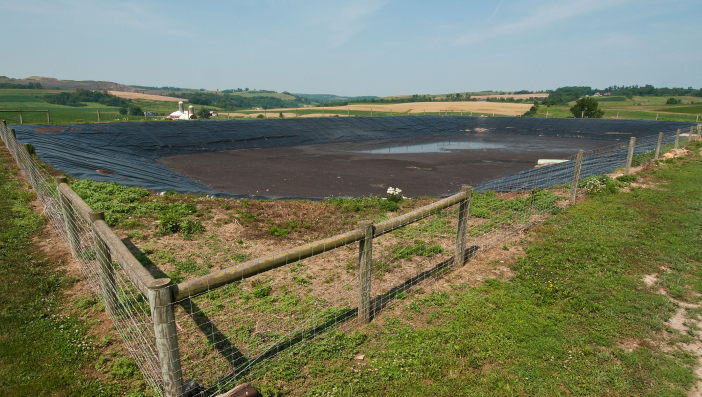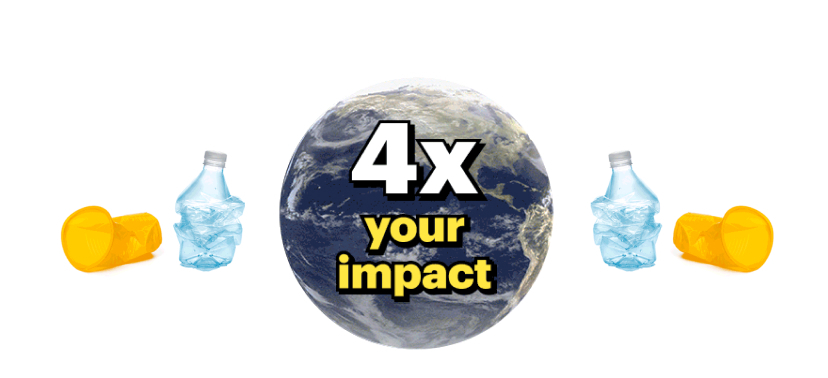ClimateFoodNews & Opinion
The Truth About Bogus Factory Farm ‘Biogas’
Factory farm biogas isn’t a climate solution. It’s an insidious invader that doesn’t deserve the public money its architects are asking for.
By Phoebe Galt and Peter Hart
Factory farms are a huge pollution menace. These industrial facilities are responsible for an array of serious threats to our air, water and climate. Factory farms are responsible for an enormous amount of methane pollution — a potent greenhouse gas supercharging the climate crisis. Now, industry wants to profit off that pollution. They’re calling the scheme “renewable natural gas,” but we prefer the term “factory farm biogas.
The most recent assessments from the EPA report methane emissions from agriculture have increased about seven percent since 1990. Emissions from factory farm manure have risen an astonishing 71 percent. The main contributor to this spike appears to be the common factory farm practice of mixing animal waste with water.

After creating this problem, the factory farm and fossil fuel industries are promoting a bogus biogas “solution” — one that we’re all paying for. It involves trapping the methane before it is released into the atmosphere, using expensive and often dangerous digesters. Then they turn it around and market it as “clean energy.” This business is booming with venture capital and government subsidies, and it enjoys mostly glowing coverage in the media. After all, turning waste into energy is a good thing, right?
It’s time to set the record straight.
Methane? More Like Methain’t
If methane emissions are the problem, factory farm biogas is hardly a solution.
The main culprit here is actually the factory farms themselves. Factory farms produce and concentrate huge amounts of waste in one location. So addressing factory farm pollution has to start with addressing factory farms themselves.
But it’s not only the presence of poop — it’s the way factory farms handle it. Many facilities mix manure and water in large waste pits. Industry prefers to use the term, “lagoons,” but that’s quite a stretch. The anaerobic conditions in those pits are what create most of the methane. As the latest EPA data explains, solid manure management techniques practiced on non-industrial farms produce far less methane. The growth of factory farms and with it the growth of stewing waste cesspools have created the industry’s methane problem. Some projects, like one we’re fighting in Delaware, go even farther, creating methane where there was none before. Poultry litter doesn’t emit methane until companies modify it to “capture” the gas for profit.
Factory Farms Drive Climate Change — Biogas Doesn’t Help
The industry’s biogas “solution” addresses only a tiny fraction of methane pollution — created by its own poor practices. Despite pouring millions of public dollars into these projects, digesters do not appear to be having much effect on actually reducing pollution. One news report noted the Obama administration and an industry group aimed to reduce agriculture’s climate pollution problem by promoting digesters. The result? Since then, factory farms have only gotten bigger, and emissions have risen 15 percent.
So a factory farm digester is not even close to a solution. At best, it transforms a small fraction of the pollution created at these facilities into pipeline-grade gas and digestate. We’ll get to that later. But in doing so, the methane refinery creates a different stream of pollution:
- The methane that will inevitably leak from pipelines and other dirty energy infrastructure;
- The pollution created by trucks that carry the gas to be injected into pipelines;
- And the pollution that is created when the gas is finally burned (releasing CO2).
Digesters use public money and incentives to prop up two of the biggest polluters — Big Ag and Big Energy.
Biogas Won’t Clean Up Factory Farms Either
What industry doesn’t tell you is there’s also the matter of the leftover poop after anaerobic digestion – what’s called “digestate.” Refining gas out of it doesn’t make that poop magically disappear. In fact, digestate has been found to contain higher concentrations of pollutants than manure, and is more water-soluble. This means the threat to clean water — a well-documented problem caused by factory farms — will persist even with biogas digesters.
Leftover digestate is generally overapplied to fields, and can either spill directly into waterways or leak into water tables from there. Those who live near factory farms know that the field application of manure has long been a menace for nearby communities. It poses real threats to people’s drinking water and health.
Frackers Love Biogas
There’s another industry as eager to hype bogus biogas as Big Ag — fossil fuel corporations and related utility companies. This might seem a little surprising at first. If factory farm gas were really a form of clean energy, it could replace gas from drilling. Wouldn’t that be bad news for the companies that make money fracking? They know better than to worry. Even the rosiest industry predictions tell us that biogas will only ever displace a small fraction of fracked gas usage.
For fossil fuel interests, this is almost a too-perfect scenario. The fracked gas industry is calling biogas their savior. They can promote biogas as ‘clean’ energy knowing it will be delivered in the same pipes that transport fossil gas. Factory farm gas does not replace fracked gas – it complements it, and further entrenches the dirty status quo.
Factory Farms And Their Waste Are No Climate Fix
Help us stop false solutions like factory farm biogas. It’s not clean energy and it’s not a path out of our climate crisis. We don’t need to rely on fairytales that paint fossil fuels and factory farms as heroes — we have the capability to rely on renewable energy now. Electing leaders with the political will to take necessary strides into a clean energy future is how we get there.
Your friends should know about this.

Time to face it~it’s people or plastics.~We can’t have both.
Become a plastic pollution fighter this Earth~Day and have your gift MATCHED $3-to-$1!

